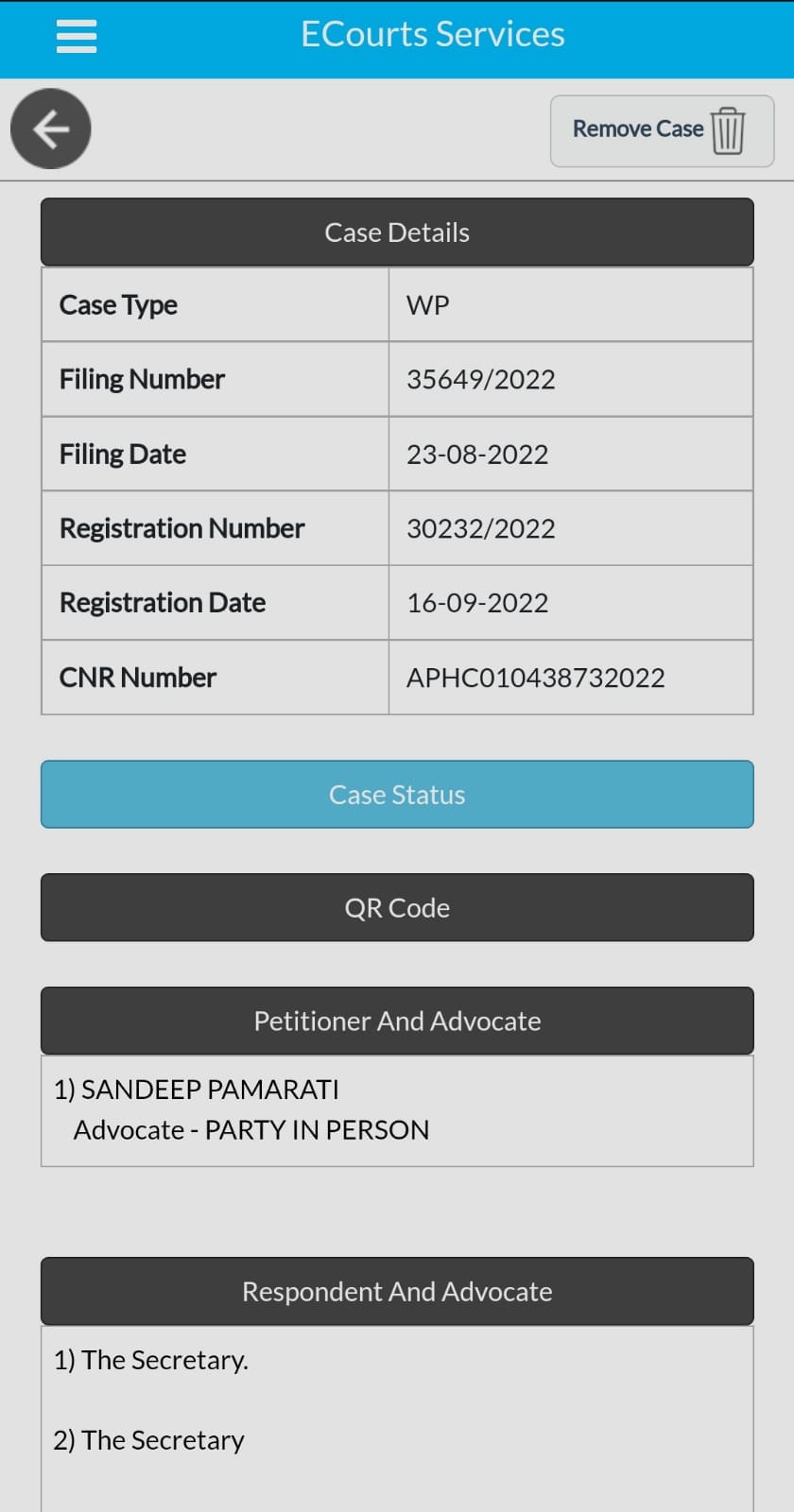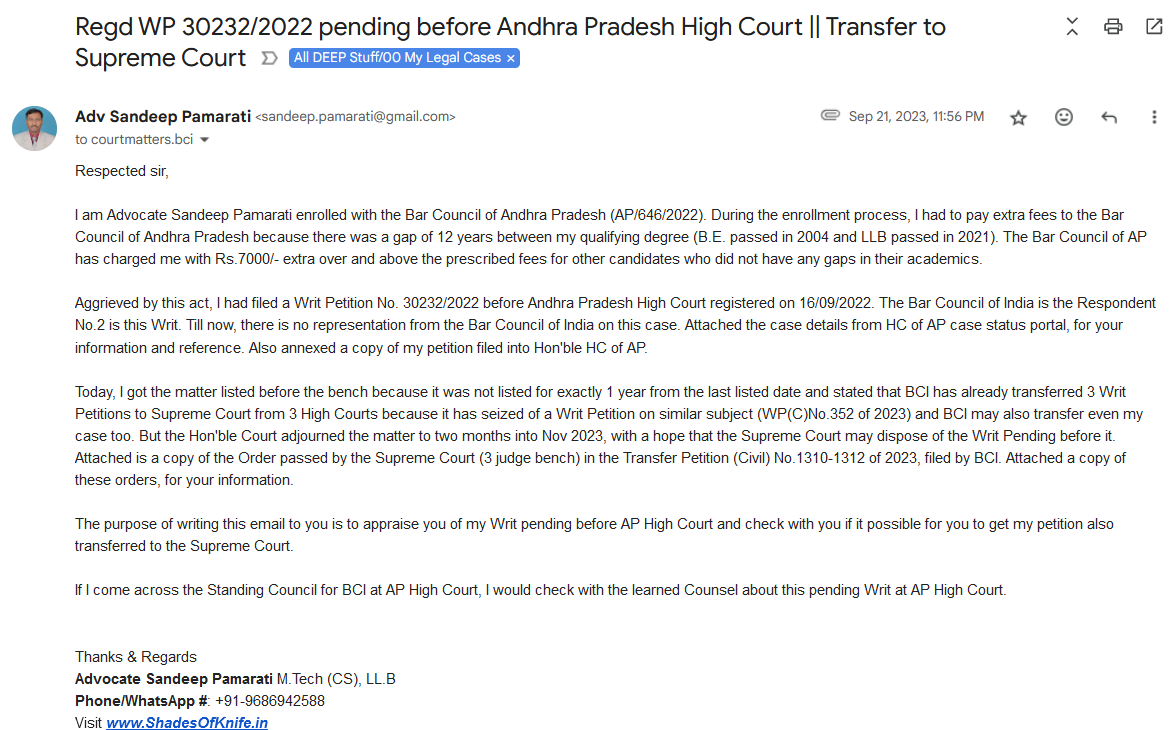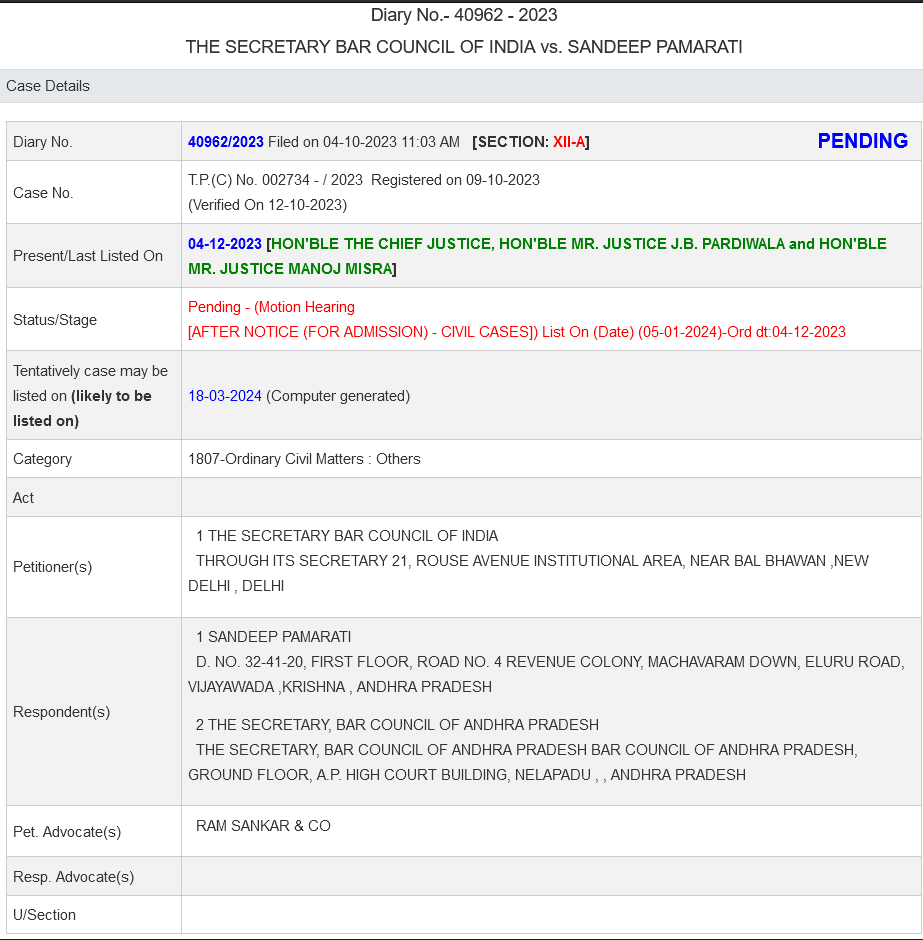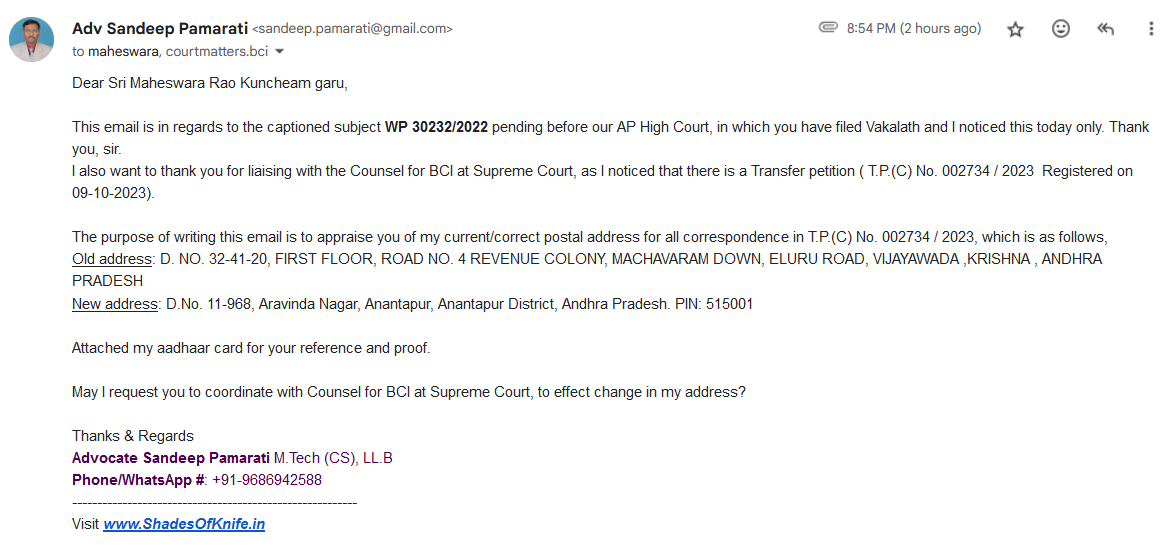A very good judgment regarding PWDV Act 2005 (Act) and the procedure to be following, in detail. Snippets from the same follow along with the 14 directions issued for the Judicial Magistrate to be followed by them in disposing DV cases in Tamil Nadu.
UPDATE: This judgment is overruled by Supreme Court here.
From Paras 3 and 4,
3. Upon a close reading of the D.V Act, this Court found that the nature of rights that were protected and enforced under the Act were purely civil in nature. However, considering the forum which was dealing with such applications, and the procedure adopted, a criminal color has been unwittingly given to these proceedings. Like a chameleon changing its colour depending on the situation, the proceedings under the D.V Act were also camouflaged due to the nature of the forum provided under the Act.
4. On the flip side, this faulty understanding of the nature of the proceedings has also given rise to a tendency to misuse these proceedings as a weapon of harassment against parties who are unrelated to the proceedings by making them stand before a Magistrate like accused persons. It is mainly on account of this abuse of process that a deluge of petitions came to be filed for quashing the proceedings under Section 12 of the D.V. Act. This sorry state of affairs was a clear clarion call that impelled this Court to undertake this exercise to bring the situation under control by laying down certain guidelines for the disposal of the applications under Section 12 of the D.V Act.
Proceedings and Offences under the Act
18. Before examining this issue, it is necessary to notice the nature of the jurisdiction exercised by the Magistrate under the D.V Act. The procedure to be followed by a Magistrate in dealing with an application for reliefs under Chapter IV is set out in Section 28 of the Act. A close reading of Section 28 would show that it draws a distinction between “proceedings” (Section 12, 18 to 23) and “offences” (Sections 31 & 33) and states that they will be governed by Cr.P.C. This general rule is subject to two exceptions. The first exception is contained in the opening words of Section 28(1) of the Act which begins with the expression “save as otherwise provided by this Act”, the effect of which is to exclude the application of the Code in areas where the procedure has been expressly set out in the D.V Act or the Protection of Women from Domestic Violence Rules, 2006 (hereinafter referred to as “D.V Rules” or “the Rules”). The second exception is found in Section 28(2) of the Act which is in the nature of a non-obstante clause expressly authorizing the Court to deviate from the procedure set out in Section 28(1) and lay down its own procedure for disposal of an application under Section 12 or a proceeding under Section 23(2) of the Act.
19. In the first instance, it is, therefore, necessary to examine the areas where the D.V. Act or the D.V. Rules have specifically set out the procedure thereby excluding the operation of Cr.P.C as contemplated under Section 28(1) of the Act. This takes us to the D.V Rules. At the outset, it may be noticed that a “complaint” as contemplated under the D.V. Act and the D.V Rules is not the same as a “complaint” under Cr.P.C. A complaint under Rule 2(b) of the D.V Rules is defined as an allegation made orally or in writing by any person to a Protection Officer. On the other hand, a complaint, under Section 2(d) of the Cr.P.C. is any allegation made orally or in writing to a Magistrate, with a view to his taking action under the Code, that some person, whether known or unknown has committed an offence. However, the Magistrate dealing with an application under Section 12 of the Act is not called upon to take action for the commission of an offence. Hence, what is contemplated is not a Officer as contemplated under Rule 4(1) of the D.V Rules.
20. Rule 6(1) sets out that an application under Section 12 of the Act shall be as per Form II appended to the Act. Thus, an application under Section 12 not being a complaint as defined under Section 2(d) of the Cr.P.C, the procedure for cognizance set out under Section 190(1)(a) of the Code followed by the procedure set out in Chapter XV of the Code for taking cognizance will have no application to a proceeding under the D.V. Act. To reiterate, Section 190(1)(a) of the Code and the procedure set out in the subsequent Chapter XV of the Code will apply only in cases of complaints, under Section 2(d) of Cr.P.C, given to a Magistrate and not to an application under Section 12 of the Act.
21. Consequently, the stage for issuance of process contemplated under Section 204, Cr.P.C has no application to a proceeding under the D.V Act as the Magistrate, in an application under Section 12 of the D.V Act, is not taking cognizance of any offence, but is only dealing with an application for civil reliefs. Furthermore, as has already been pointed out, the respondent before the Court in an application under Section 12 of the Act is not an accused. Hence, the requirement of framing a charge does not arise either. (See V. Palaniammal v. Thenmozhi (2010) 1 MWN Cri 217).
24. A close reading of the aforesaid provisions would show that the procedure set out in the D.V Act and the Rules makes a conscious deviation from the traditional modes of a criminal court taking cognizance, issuing process and then trying the accused under the provisions of the Cr.P.C. save in the case of offences under Section 31 & 33 of the Act. Thus, the application of the Cr.P.C. to an application under Section 12 is residuary in nature by virtue of the mandate of Section 28(1) of the D.V Act.
So, 482 CrPC does not apply to a DV proceeding, which is civil in nature…
40. As the proceedings before a Magistrate exercising jurisdiction under Chapter IV is not a criminal proceeding before a Criminal Court, the next question is whether a petition under Section 482 of the Code would lie to quash an application under Section 12 of the D.V. Act. It is settled law that a petition under Section 482, Cr.P.C would lie only against an order of a criminal court.
41. As pointed out by a Division Bench of this Court in Rajamanickam v State of Tamil Nadu, 2015 (3) MWN Cri 379, Section 482 Cr.P.C preserves only the inherent criminal jurisdiction of the High Court. Thus, a petition under Section 482, Cr.P.C would be maintainable only if the order complained of is passed by a criminal Court or by a Court in exercise of powers under the Cr.P.C. Quashing an application under Section 12 of the D.V Act does not fall in either category, as what the Court is called upon to do at that stage is to interdict the exercise of civil jurisdiction by the Magistrate at the threshold. As indicated supra, since the Magistrate is exercising only a civil jurisdiction in granting reliefs under Chapter IV of the Act, it follows that a Magistrate is not a criminal court for the purposes of proceedings under Chapter IV of the Act. It follows that an application under Section 482, Cr.P.C does not lie to quash an application under Section 12 of the D.V Act.
So, no remedy then…? (IMHO, apart from Article 227, a petition under sec 151 C.P.C. should also be available to quash the DV proceeding, if it is necessary for the ends of justice or to prevent abuse of the process of the Court.)
42. This does not, however, mean that an aggrieved respondent is remediless. The Magistrate exercising jurisdiction under Chapter IV of the D.V Act, is certainly a subordinate Court for the purposes of Article 227, and a petition under Article 227 of the Constitution would still be available challenging the proceedings under Chapter IV of the D.V Act, in an appropriate case.
Class for the lower trial Courts…
51. It has been brought to the notice of this Court that in several cases, Magistrates continue to mechanically follow the drill of the procedure set out in Sections 190(1)(a), 200 to 204, Cr.P.C and issue summons as if the respondents before it are accused of offences. To compound the confusion, in most of these cases all and sundry are roped in as respondents before the Magistrate. These respondents, upon being summoned, file petitions under Section 205, Cr.P.C to dispense with their personal attendance and thereafter file petitions under Section 482, Cr.P.C to obtain a stay of all further proceedings in the case, and in most cases their personal appearance before the Magistrate is also dispensed with, and the case is then thrown into the backburner. All of this, it appears, is on account a perceptible lack of clarity in the procedure followed by the Magistrates while deciding applications under the Act.
Directions follow:
52.While it is no doubt true that the Court of Magistrate is invested with a great deal of flexibility under Section 28(2) of the Act to devise its own procedure for disposal of an application under Section 12 of the Act, the twin principles of consistency and clarity dictate that this Court must now lay down some broad guidelines, in exercise of its power of superintendence under Article 227 of the Constitution & in respect of Judicial Magistrates under Section 483 of the Cr.P.C, for the proper disposal of applications under Section 12 of the D.V Act. A corrective mechanism is available in the D.V Act itself for aggrieved parties to agitate their grievances and obtain redress.
The following directions are, therefore, issued:
i. An application under Section 12 of the D.V. Act, is not a complaint under Section 2(d) of the Cr.P.C. Consequently, the procedure set out in Section 190(1)(a) & 200 to 204, Cr.P.C as regards cases instituted on a complaint has no application to a proceeding under the D.V Act. The Magistrate cannot, therefore, treat an application under the D.V Act as though it is a complaint case under the Cr.P.C.
ii.An application under Section 12 of the Act shall be as set out in Form II of the D.V Rules, 2006, or as nearly as possible thereto. In case interim ex-parte orders are sought for by the aggrieved person under Section 23(2) of the Act, an affidavit, as contemplated under Form III, shall be sworn to.
iii. The Magistrate shall not issue a summon under Section 61, Cr.P.C to a respondent(s) in a proceeding under Chapter IV of the D.V Act. Instead, the Magistrate shall issue a notice for appearance which shall be as set out in Form VII appended to the D.V Rules, 2006. Service of such notice shallbe in the manner prescribed under Section 13 of the Act and Rule 12 (2) of the D.V Rules, and shall be accompanied by a copy of the petition and affidavit, if any.
iv. Personal appearance of the respondent(s) shall not be ordinarily insisted upon, if the parties are effectively represented through a counsel. Form VII of the D.V Rules, 2006, makes it clear that the parties can Magistrate either in person or through a duly authorized counsel. In all cases, the personal appearance of relatives and other third parties to the domestic relationship shall be insisted only upon compelling reasons being shown. (See Siladitya Basak v State of West Bengal (2009 SCC Online Cal 1903).
v. If the respondent(s) does not appear either in person or through a counsel in answer to a notice under Section 13, the Magistrate may proceed to determine the application ex-parte.
vi. It is not mandatory for the Magistrate to issue notices to all parties arrayed as respondents in an application under Section 12 of the Act. As pointed out by this Court in Vijaya Baskar (cited supra), there should be some application of mind on the part of the Magistrate in deciding the respondents upon whom notices should be issued. In all cases involving relatives and other third parties to the matrimonial relationship, the Magistrate must set out reasons that have impelled them to issue notice to such parties. To a large extent, this would curtail the pernicious practice of roping in all and sundry into the proceedings before the Magistrate.
vii. As there is no issuance of process as contemplated under Section 204, Cr.P.C in a proceeding under the D.V Act, the principle laid down in Adalat Prasad v Rooplal Jindal (2004 7 SCC 338) that a process, under Section 204, Cr.P.C, once issued cannot be reviewed or recalled, will not apply to a proceeding under the D.V Act. Consequently, it would be open to an aggrieved respondent(s) to approach the Magistrate and raise the issue of maintainability and other preliminary issues. Issues like the existence of a shared household/domestic relationship etc., which form the jurisdictional basis for entertaining an application under Section 12, can be determined as a preliminary issue, in appropriate cases. Any person aggrieved by such an order may also take recourse to an appeal under Section 29 of the D.V Act for effective redress (See V.K Vijayalekshmi Amma v Bindu. V, (2010) 87 AIC 367). This would stem the deluge of petitions challenging the maintainability of an application under Section 12 of the D.V Act, at the threshold before this Court under Article 227 of the Constitution.
viii. Similarly, any party aggrieved may also take recourse to Section 25 which expressly authorises the Magistrate to alter, modify or revoke any order under the Act upon showing change of circumstances.
ix. In Kunapareddy (cited supra), the Hon’ble Supreme Court upheld the order of a Magistrate purportedly exercising powers under Order VI, Rule 17 of The Code of Civil Procedure, 1908 (hereinafter referred to as “C.P.C.”), to permit the amendment of an application under Section 12 of the D.V Act. Taking a cue therefrom, it would be open to any of the respondent(s), at any stage of the proceeding, to apply to the Magistrate to have their names deleted from the array of respondents if they have been improperly joined as parties. For this purpose, the Magistrate can draw sustenance from the power under Order I Rule 10(2) of the C.P.C. A judicious use of this power would ensure that the proceedings under the D.V Act do not generate into a weapon of harassment and would prevent the process of Court from being abused by joining all and sundry as parties to the lis.
x. The Magistrates must take note that the practice of mechanically issuing notices to the respondents named in the application has been deprecated by this Court nearly a decade ago in Vijaya Baskar (cited supra). Precedents are meant to be followed and not forgotten, and the Magistrates would,
therefore, do well to examine the applications at the threshold and confine the inquiry only to those persons whose presence before it is proper and necessary for the grant of reliefs under Chapter IV of the D.V Act.
xi. In Satish Chandra Ahuja (cited supra), the Hon’ble Supreme Court has pointed out the importance of the enabling provisions under Section 26 of the D.V Act to avoid multiplicity of proceedings. Hence, the reliefs under Chapter IV of the D.V can also be claimed in a pending proceeding before a civil, criminal or family court as a counter claim.
xii. While recording evidence, the Magistrate may resort to chief examination of the witnesses to be furnished by affidavit (See Lakshman v Sangeetha, 2009 3 MWN (Cri) 257. The Magistrate shall generally follow the procedure set out in Section 254, Cr.P.C while recording evidence.
xiii. Section 28(2) of the Act is an enabling provision permitting the Magistrate to deviate from the procedure prescribed under Section 28(1), if the facts and circumstances of the case warrants such a course, keeping in mind that in the realm of procedure, everything is taken to be permitted unless
prohibited (See Muhammad Sulaiman Khan v Muhammad Yar Khan, 1888 11 ILR All 267).
xiv. A petition under Article 227 of the Constitution may still be maintainable if it is shown that the proceedings before the Magistrate suffer from a patent lack of jurisdiction. The jurisdiction under Article 227 is one of superintendence and is visitorial in nature and will not be exercised unless there exists a clear jurisdictional error and that manifest or substantial injustice would be caused if the power is not exercised in favour of the petitioner. (See Abdul Razak v. Mangesh Rajaram Wagle (2010) 2 SCC 432, Virudhunagar Hindu Nadargal Dharma Paribalana Sabai v. Tuticorin Educational Society, (2019) 9 SCC 538.) In normal circumstances, the power under Article 227 will not be exercised, as a measure of self-imposed restriction, in view of the corrective mechanism available to the aggrieved parties before the Magistrate, and then by way of an appeal under Section 29 of the Act.
Dr.P.Pathmanathan and Ors Vs V.Monica and Anr on 18 Jan 2021
Citations :
Other Sources :




